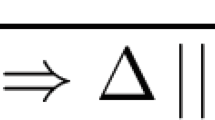Abstract
We present a solution to Problem #66 from the RTA open problem list. The question is whether there exists an equational theory E such that E-unification with constants is decidable but general E-unification is undecidable. The answer is positive and we show such a theory. The problem has several equivalent formulations, therefore the solution has many consequences. Our result also shows, that there exist two theories E 1 and E 2 over disjoint signatures, such that E 1-unification with constants and E 2-unification with constants are decidable, but (E 1 ∪ E 2)-unification with constants is undecidable.
Similar content being viewed by others
References
Baader, F., Büttner, W.: Unification in commutative idempotent monoids. Theor. Comput. Sci. 56, 345–353 (1988)
Baader, F., Nipkow, T.: Term Rewriting and All That. Cambridge University Press (1999)
Baader, F., Schulz, K.: Unification in the union of disjoint equational theories: combining decision procedures. In: 11th CADE. LNCS, vol. 607. Springer, Saratoga Springs, NY (1992)
Baader, F., Schulz, K.U.: Unification in the union of disjoint equational theories: combining decision procedures. J. Symbol. Comput. 21, 211–243 (1996)
Baader, F., Snyder, W.: Unification theory. In: Robinson, A., Voronkov, A. (eds.) A Chapter in Handbook of Automated Reasoning. Elsevier/MIT Press (2001)
Bürckert H.-J., Herold A., Schmidt-Schauss, M.: On equational theories, unification and decidability. In: Proc. of the 2nd RTA. LNCS, vol. 256, pp. 204-215. Springer-Verlag (1987)
Hopcroft, J.E., Motwani, R., Ullman, J.D.: Introduction to Automata Theory, Languages, and Computation, 2nd edn. Addison-Wesley (2001)
Kapur, D., Narendran, P.: Double-exponential complexity of computing a complete set of AC-unifiers. In: LICS, Santa Cruz, CA (1992)
Narendran, P., Otto, F.: Single versus simultaneous equational unification and equational unification for variable-permuting theories. J. Autom. Reason. 19, 87–115 (1997)
Nelson, G., Oppen, D.C.: Fast decision procedures based on congruence closure. J. ACM 27(2), 356–364 (1980)
The RTA List of Open Problems: http://rtaloop.pps.jussieu.fr/. Accessed 15 September 2008
Schmidt-Schauss, M.: Unification in a combination of arbitrary disjoint equational theories. J. Symbol. Comput. 8(1/2), 51–99 (1989)
Author information
Authors and Affiliations
Corresponding author
Rights and permissions
About this article
Cite this article
Otop, J. E-unification with Constants vs. General E-unification. J Autom Reasoning 48, 363–390 (2012). https://doi.org/10.1007/s10817-010-9201-2
Received:
Accepted:
Published:
Issue Date:
DOI: https://doi.org/10.1007/s10817-010-9201-2



